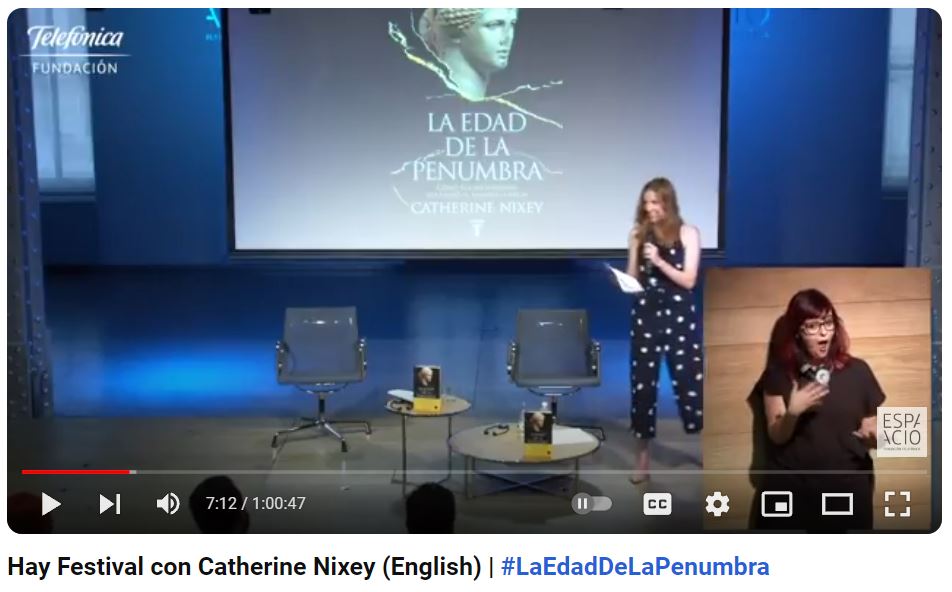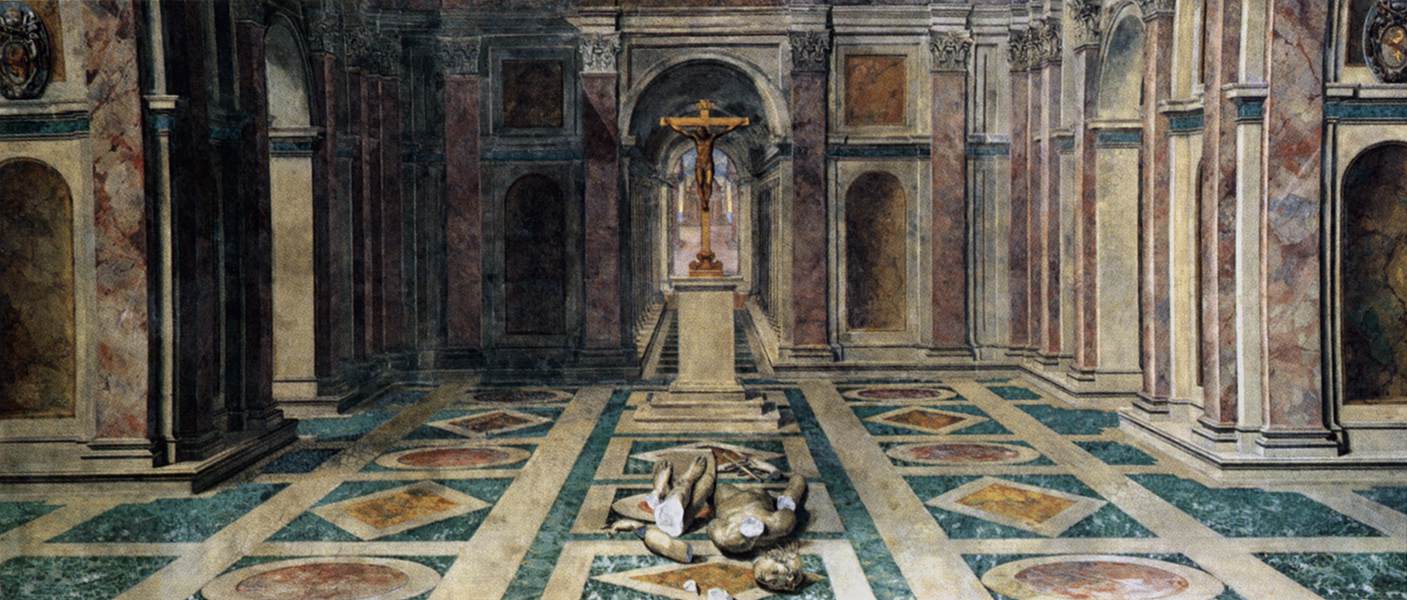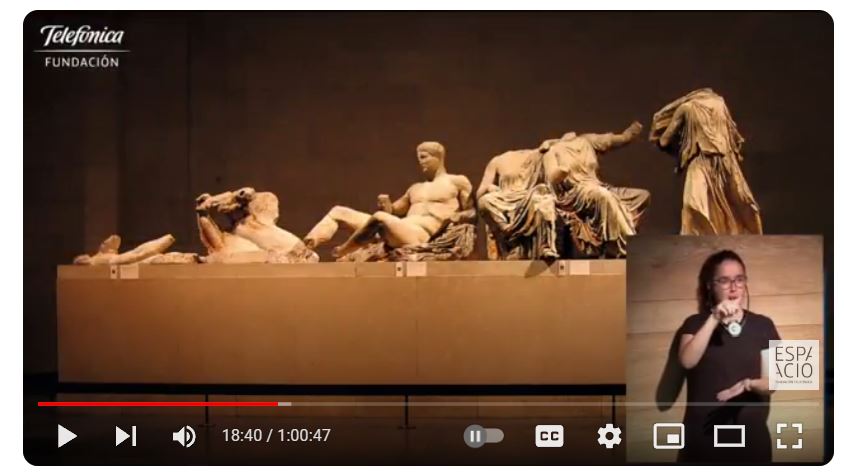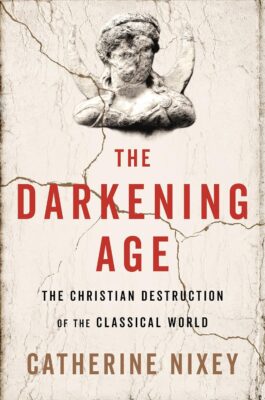Catherine Nixey

***
With the collaboration of HAY FESTIVAL, an international literature and art festival that has one of its headquarters in Segovia, we received in our auditorium the historian and journalist Catherine Nixey, author of ‘The Age of Penumbra’ (Taurus, 2018), one one of the most revealing essays of this year in which he describes the decline of classical culture affected by the triumph of Christianity. Throughout the activity, the author spoke with journalist Ramón González-Férriz

Hello again. Thank you for having me. Now, I want to talk tonight about what happened in the clash between the Christians and the Romans. Now we all know what happened in the clash between the Christians and the Romans. We’ve seen it in a hundred Hollywood films. We’ve seen it in our history books, we’ve seen it in magnificent paintings like this one. The way that Hollywood tells it is this. Christians wearing white, often singing hymns are pursued to the death by Romans who are often fat, usually nasty and frequently played by Peter Ustinov. Now, the Romans in this film are relentless and brutal, and the Christians are innocent and put upon. Now I know this story better than most because I’m the daughter of a monk and a nun, a not very good monk and a nun. And as the daughter of a monk and a nun, you are brought up believing firmly in certain things. So I believed in one holy Catholic and apostolic church. I believed in the communion of saints, the forgiveness of sins and life everlasting. I thought it was completely fine to wear socks with sandals in summer. I also believed that in the clash between the Christians and the Romans, it had been the Christians who were holy in the right and the Romans who were holy in the wrong. I was wrong to understand what really happened in the crash between the Christians and the Romans. I want to take you instead to somewhere far away from the pictures of Christian and Roman encounters that we know far away from this kind of thing. I want to take you instead to North Africa at the end of the fifth century.
I want to imagine you to imagine that you’re in a world where Christianity isn’t the safely established religion of Europe, where we don’t all know priests, and we haven’t all been to church where Christmas isn’t our main festival, and churches don’t stand on every street corner as they do here in Madrid. I want you to imagine instead a time when Christianity is anew and to many surprising religion to have been suddenly taken on by the emperor, the greatest empire on earth. And I want you to imagine you are in a festival, not in a Christian festival. I want you to imagine you’re in a kind of festival that none of us will have ever seen and that none of us will ever see. I want you to imagine you’re in a pagan festival. Now, pagan festivals were riotous affairs. They often went on for three days. There was singing, eating, drinking, dancing. People brought the tables out into the streets, people dressed as Gods men dressed as women. Everyone got drunk. It was a lot of fun. The Christians later had to get very cross about pagan festivals. But at this pagan festival, what is interesting is not what’s being celebrated, it’s what happens in the middle of the festival because in among the singing and the dancing and the music, something seems to be happening.
You would’ve sensed rather than heard the panic at first, people in this festival were frightened. And then you would’ve heard it. You would’ve heard the cry that if you’d lived in North Africa in this period would’ve made the hairs on the back of your neck stand up a two word cry. And what it meant was that young men had come in, young men who everyone in North Africa knew at this period were Christians and whose greatest desire was not to worship God but to be killed for God.
Because these Christians wanted above all one thing. They wanted everyone to become Christian, but they also wanted for themselves martyrdom. They wished to die in the service of their God. And why wouldn’t they? Because on Earth these people were despised. They were the lowest of the low. If they died for their God in heaven, they would become martyrs. They would have a hundred times the rewards of Christians on earth a hundred times the oxen, a hundred times the children. And so they attacked parties hoping less, less to kill or attack. Though they did kill and they did attack. They stabbed people. Sometimes they dragged priests from their houses. They cut out tongues. They stabbed people with pieces of old wood. But really what they wanted to do was to die. And they said their two words, laudate dominum, praise the Lord.
Because in this period to be killed in the service of your God, for these men, nothing could be greater. So when we come back and when we consider the Christian story, this story of these lovely Christians wearing white who are pursued by the Romans, it’s worth considering again what actually happened. So in those three centuries of Roman rule, fewer than there were fewer than 13 years of imperial persecution of Christians, often it was less that the Romans wanted to kill them than the Christians wanted to die.
There’s a wonderful account of a Roman governor called Arias Antoninus, who is a province in North Africa, and he’s at work one day when some Christians turn up, they hear that he’s put to death a couple of Christians in his province. So he’s Roman, he’s not a saint. They did do it. And then he finds the next day all of the Christians in his band, in his province turn up in one united band. And they say to him, Arias put us to death. We want to die. And Aria is totally baffled. Why do these people want to die? And his reply is so Roman, you wretches. He says, have you not got cliffs? You can jump off. Have you not got ropes you can hang yourself with?
It’s a very pragmatic Roman response. If you really want to die, why are you involving me in this strange habit? And look again at the virtue of the Christians. So we think of them as being the victims, the put upon people, the violence free, the people who commit no violence, but far more Christians were killed by Christians once the Christians had taken power than whatever ever killed by Romans. Romans killed baby hundreds of Christians, Christian persecution of Christians alone, let alone what they did to Pagans did away with thousands.
There are other numbers that help us to understand what really happened. The turning point in this whole story is when the Emperor Constantine started to espouse this new religion of Christianity. Now in the Christian stories, this is told as a great moment of liberation, people could come out into the streets, they could be free. People looked at each other with smiling faces and shining eyes. But in fact, when Constantine started to espouse Christianity, there were under 10% of his empire were Christians, 90% were not. Whatever this religion was that he was bringing, it wasn’t the religion of the masses, it was the religion of the few and of him. And then soon after, of the powerful. And soon after that, it was their religion of everybody.
So how do you convert an empire of 60 million people? Because he did, the Christians did. Within a hundred years, Constantine felt able to say, well, Constantine’s successes felt able to say that there were no more pagans. So when he takes power, 90% of the empire are pagan. Within a hundred or more, 120 years. They feel free to say that there are none. There are no more. They have wiped out the ancient religions of the empire in just over a hundred years.
An astonishing reversal, a whole empire changing its religion in a century. I mean, that doesn’t happen without effort. That doesn’t solely happen with love and Christian charity and the charisma of St. Paul that demands more. And what it demanded is what my book is about. What was actually involved in the triumph of Christianity was persuasion, yes, but was also laws and also fines. And also the chaining doors of temples and the smashing of statues and the stealing of wealth and the outlawing of every single religion but your own. And in the end, the physical harm and eventually execution of all. And everybody who doesn’t fall into line with you.

This is a surprise to us now, but it used to be remembered that the triumph of Christianity was more violent. So this painting is from the roof of the Vatican. It’s called the triumph of Christianity. And as you can see, it shows across that has been erected. And if you look down a pagan statue of a pagan God, licious has been toppled and his head has been smashed off. This isn’t just rhetoric. This happened as numerous, numerous examples of when this happened. My book starts with an attack on a temple in Palmera. But look at any Greek temple. Look at numerous Greek temples across the world, and you’ll see similar signs in Britain, some of the most famous classical statues of all of these, the Parson marbles, you may know there’s a big argument going on about whether we should return them to Greece. I’m not going to get into that here, We shouldn’t.
 But they’re most known as this in this state. So if you look at them, they’re in a terrible way. Some are missing feet, some are missing hands, some are missing heads. And what you can’t really get a sense of here is, but the whole of the middle of the Parthenon, this is the East pediment has gone Now, when I was younger, when I was first studying classics, I thought that this was just the accident of time, time, weather, stone, stoners, fragile stuff. They’d been knocked off.
But they’re most known as this in this state. So if you look at them, they’re in a terrible way. Some are missing feet, some are missing hands, some are missing heads. And what you can’t really get a sense of here is, but the whole of the middle of the Parthenon, this is the East pediment has gone Now, when I was younger, when I was first studying classics, I thought that this was just the accident of time, time, weather, stone, stoners, fragile stuff. They’d been knocked off.
